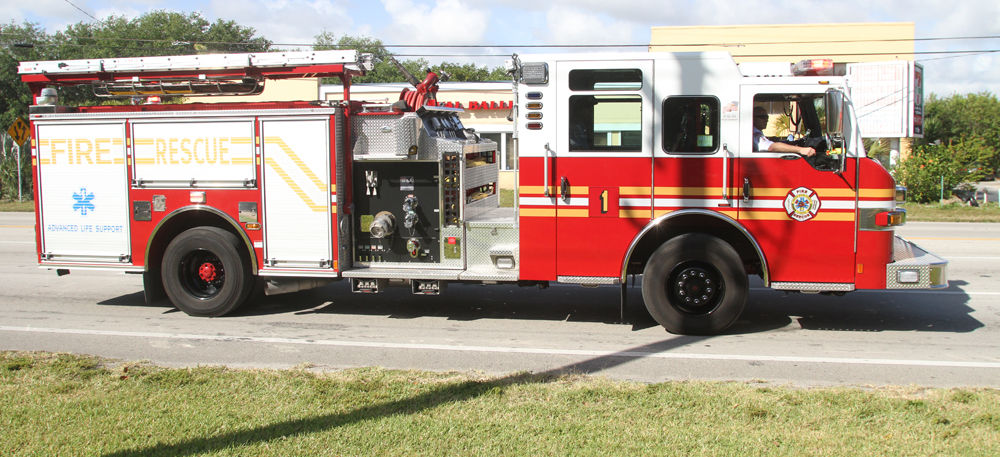INDIAN RIVER COUNTY — Assistant Chief for Emergency Medical Services Brian Burkeen said Wednesday that the first modular housing unit for firefighters is expected to arrive in about two weeks, but that it will be late June or early July before workers can live in them.
Modulars were ordered to house firefighters and paramedics from Station 7 on Ranch Road near Interstate 95 and Station 1 on Old Dixie Highway in Vero. Station 1 is set to be gutted and renovated at a cost of more than $1.1 million. The County is considering demolishing Station 7 and purchasing or leasing property to build anew in a different location.
“We have had conversations with the manufacturer in regards to the modular buildings and the expected delivery date of the first one is June 9, 2015. This date of delivery may change given any scheduling conflicts from the builder,” Burkeen said in response to questions from VeroNews.com.
A purchase order dated April 10 shows that two modular buildings were ordered from Modular Building Systems International in Clermont, at an all-in cost including setup and transport of just under $100,000 each. Each 24-foot by 60-foot commercial-grade modular building will house up to five people and will be rated for wind speeds of up to 170 miles per hour once secured properly on the site.
In the meantime, the Board of County Commissioners told the staff in late March to get firefighters out of those two stations as soon as possible to remove the first responders from potential environmental hazards, including mold and debris from rodent infestations.
Management personnel and the ladder company from Station 1 were moved to other stations in Vero for the duration of the renovations, leaving a skeleton crew of firefighters and paramedics at the Old Dixie station.
The Board initially approved $250,000 for the modulars, and last week commissioners added $200,000 to that in hopes of expediting the process.
The units are manufactured in Georgia, Burkeen said, and “will be delivered straight from the factory.”
After the modulars arrive, they will need to be hooked up to utilities and to the county’s emergency communications system.
“Applications for permit at Station 1 has been submitted to the City of Vero Beach and we are awaiting approval of that permit,” Burkeen said.
The Emergency District staff is evaluating some options for the workers at Station 7, including an idea floated by Chairman Wesley Davis last week to house firefighters on the existing fire station property instead of moving operations twice.
“Once arrived and permits are obtained, we anticipate that they will be move-in ready within 21 to 30 days given there are no delays. We do not anticipate any delays in the process,” Burkeen said.
On Tuesday, the Indian River Association of Fire Fighters Local 2201 President John O’Connor released a statement, plus more than 200 pages of investigative reports on four fire stations. O’Connor in that statement demanded firefighters be moved out of the four affected stations which tested positive for mold.
Firefighters claim that the water intrusion that resulted in the mold problems has been caused by the County’s failure to properly maintain and repair leaks and other structural issues at the stations, some dating back to damage from the 2004 and 2005 hurricanes. Last fall, the County replaced the entire roof on Station 11 at Orchid.
Station 11 and Station 10 in Fellsmere are in the process of being repaired, but the decision was made by management for firefighters to shelter in place during the repairs, as work was scheduled to be completed in a shorter amount of time than it would take for modular buildings to arrive.
The union says more than 70 firefighters have filed workers’ compensation claims for exposure to mold in the stations where they work and live while on shift. Of those, 14 so far have tested positive for mold-related toxins in their systems.
County Administrator Joe Baird, who has long denied the validity of firefighters’ allegations that there is toxic mold present in the County’s fire stations, commented on Wednesday that some of the testing performed on the stations by the union’s technicians was “not by industry standards.”
Baird also objected to the characterization that the living area in the stations tested positive for high levels of mold.
“Not true, our study didn’t show that. There’s mold everywhere you go, especially in Florida,” Baird said Wednesday. “They were not high levels. The mold was higher outside,” referring to the air in the natural environment outside the fire stations.
Specimens taken by technicians hired by the firefighters union tested for mold and bacteria in the surfaces inside the stations — the drywall, vents, ceiling panels and ducts.

